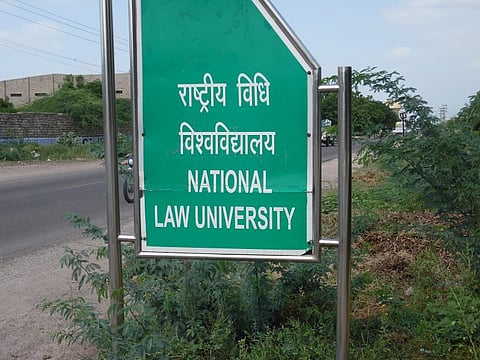
- Latest Legal News
- News
- Dealstreet
- Viewpoint
- Columns
- Interviews
- Law School
- Legal Jobs
- हिंदी
- ಕನ್ನಡ

Shashank Pandey
In 2017, a study published by Centre for Disability Studies and Health Laws (CDHSL) showed that a majority of National Law Universities (NLUs) do not follow the 5% seat reservation criteria for Persons with Disabilities (PwDs).
As per Rights of Persons with Disabilities Act, 2016, all institutions of higher education that receive government aid have to reserve at least 5% seats for Persons with Benchmark Disabilities and give them an age relaxation of minimum five years for admission.
The 2016 Act, which replaced the Persons with Disabilities (Equal Opportunities, Protection of Rights and Full Participation Act) 1995, provides for “reservation in the higher educational institutions” under Section 32. It requires all government institutions of higher education and other higher education institutions receiving aid from the government to reserve not less than 5% seats for Persons with Benchmark Disabilities (not less than 40% of the specified disability).
The 1995 Act was replaced after court’s order in Disabled Rights Group and Another v. Union of India and Others since there was a gross violation of the 1995 Act. The earlier Act provided for reservation of only 3% seats for such persons. However, in 2016, this number was increased to 5%.
One year after it was reported here, we take a look at the data of different NLUs for this year to see how if they have followed this requirement.
| NLU | Total No. of Seats | Seats to be reserved as per 2016 Act | Reservation prescribed in brochure | Seats reserved in allotment list |
| NLSIU | 80 | 4 | 5% (4 seats) | 4 |
| NALSAR | 105 | 5.25 | 5% (5 seats) | 5 |
| NLIU | 122 | 6.1 | 5 seats | 5 |
| WBNUJS | 116 | 5.8 | 6 seats | 5 |
| NLUJ | 120 | 6 | 5% | 5 |
| HNLU | 180 | 9 | 5% | 4 |
| GNLU | 180 | 9 | 5% | 8 |
| RMLNLU | 178 | 8.9 | 3% | 8 |
| RGNUL | 180 | 9 | 5% (9 seats) | 9 |
| CNLU | 140 | 7 | 3% | 6 |
| NUALS | 60 | 3 | 5% | 3 |
| NLUO | 180 | 9 | 9 | 9 |
| NUSRL | 120 | 6 | 6 | 6 |
| NLUJAA | 60 | 3 | 3 | 3 |
| DSNLU | 120 | 6 | 5% | 5 |
| TNNLS | 120 | 6 | 6 | 6 |
| MNLU Mumbai | 100 | 5 | 3% | 3 |
| MNLU Nagpur | 120 | 6 | 5% | 6 |
| MNLU Aurangabad | 60 | 3 | 5% | 3 |
| HPNLU | 120 | 6 | 5% | 6 |
| DNLU | 120 | 6 | 5% | 6 |
| NLU Delhi | 80 | 4 | 5% | 4 |
Analysis
For the convenience of analysis, the 22 NLUs will be divided into three categories:
Category I- NLUs prescribing only percentage of seats to be horizontally reserved.
Category II- NLUs prescribing only number of seats to be reserved.
Category III– NLUs prescribing both percentage and number of seats to be reserved.
The Category I NLUs (10) in the list are- NLUJ, HNLU, GNLU, RMLNLU, CNLU, NUALS, DSNLU, MNLU (Mumbai), MNLU (Nagpur), MNLU (Auranagabad) and NLU D. Out of these, RMLNLU, CNLU and MNLU Mumbai are in clear violation of the 2016 Act, as all three prescribe 3% reservation for Persons with Disabilities.
It is seen that out of the 10 NLUs in this category, only NUALS, MNLU (Nagpur) and MNLU (Aurangabad) correctly meet the requirement of 5% of total seats. The remaining 7 are in direct violation of the prescribed minimum.
In MNLU (Mumbai) and MNLU (Aurangabad) only those PwD can take the benefit of the reservation policy who has a Maharashtra domicile. No other NLU imposes domicile imposition on PwD to avail the benefit of the reservation.
The Category II NLUs (6) are- NLIU, WBNUJS, NLUO, NUSRL, NLUJA and TNNLU. NLIU and WBNUJS fail to meet the necessary requirement of 6 seats each (rounded off figure). The other four NLUs in the category meet their statutory requirement by reserving 9, 6, 3 and 6 seats respectively.
The Category III NLUs (5) are- NLSIU, NALSAR, RGNUL, HPNLU and DNLU. All the NLUs in this category meet the necessary requirement of 5 %.
Observations
Only 9 out of 22 NLUs exactly follow the requirement provided under the Rights of Persons with Disabilities Act, 2016. However, 12 of them reserve the requisite number of seats for PwD candidates. Though this number is better than last year’s, there is definitely scope for improvement.
Given the fact that these are the top law schools in the country, they ought to correct a violation of the statute on their part. It is hoped that they will follow the law both in letter and in spirit.
These elite law institutions are set up with an objective to nurture the best legal talent in the country. The exclusion of a minority like Persons with Disabilities goes against this objective. We can only hope that these NLUs serve as the guiding light they were meant to be.
The author is a fourth year student of Ram Manohar Lohiya National Law University, Lucknow.